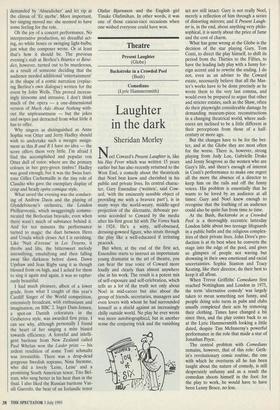Theatre
Present Laughter (Globe) Backstroke in a Crowded Pool (Bush) Comedians (Lyric Hammersmith)
Laughter in the dark
Sheridan Morley
Noel Coward's Present Laughter is, like his Hay Fever which was written 15 years earlier but has also recently returned to the West End, a comedy about the theatricals that Noel best knew and cherished in his public and private lives. Its central charac- ter, Gary Essendine ('written', said Cow- ard, 'with the eminently sensible object of providing me with a bravura part'), is in many ways the world-weary, middle-aged projection of the dilettante, debonair per- sona accorded to Coward by the media after his first great hit with The Vortex back in 1924. He's a witty, self-obsessed, dressing-gowned figure, who struts through the play like a well-educated if irritating peacock.
But when, at the end of the first act, Essendine starts to instruct an importunate young dramatist in the art of theatre, you can hear the true voice of Coward more loudly and clearly than almost anywhere else in his work. The result is a potent mix of self-exposure and self-celebration, which tells us a lot of the truth not only about Noel in mid-career but also about the group of friends, secretaries, managers and even lovers with whom he had surrounded himself as a shield against an increasingly chilly outside world. No play he ever wrote was more autobiographical, but in another sense the conjuring trick and the vanishing
act are still intact: Gary is not really Noel, merely a reflection of him through a series of distorting mirrors; and if Present Laugh- ter is, in the end, about anything very philo- sophical, it is surely about the price of fame and the cost of charm.
What has gone wrong at the Globe is the decision of the star playing Gary, Tom Conti, to direct the play himself, to shift its period from the Thirties to the Fifties, to have the leading lady play with a funny for- eign accent and to rewrite the ending. I do not, even as an adviser to the Coward estate, necessarily believe that all the Mas- ter's works have to be done precisely as he wrote them to the very last comma, and would even be prepared to argue that other and stricter estates, such as the Shaw, often do their playwright considerable damage by demanding museum-piece reconstructions in a changing theatrical world, where audi- ences are inclined to be a little different in their perceptions from those of a half- century or more ago.
But the changes have to be for the bet- ter, and at the Globe they are most often for the worse. There is, however, strong playing from Judy Loe, Gabrielle Drake and Jenny Seagrove as the women who are Gary's life, and there's enough of interest in Conti's performance to make one regret all the more the absence of a director to keep him on the rails and off the funny voices. His problem is essentially that he wants to be loved by an audience at all times: Gary and Noel knew enough to recognise that the loathing of an audience could also be quite fun from time to time.
At the Bush, Backstroke in a Crowded Pool is a thoroughly eccentric latterday London fable about two teenage lifeguards in a public baths and the religious complex- ities of their private lives. John Dove's pro- duction is at its best when he converts the stage into the edge of the pool, and gives us glimpses of people not waving but drowning in their own emotional and racial uncertainties. Sophie Stanton and Tracy Keating, like their director, do their best to keep it all afloat.
When Trevor Griffiths' Comedians first reached Nottingham and London in 1975, the term 'alternative comedy' was largely taken to mean something not funny, and people doing solo turns in pubs and clubs usually completed their acts by removing their clothing. Times have changed a bit since then, and the play comes back to us at the Lyric Hammersmith looking a little dated, despite Tim McInnerny's powerful performance in the role that made a star of Jonathan Pryce.
The central problem with Comedians remains, however, that of this role: Geth- in's revolutionary comic routine, the one with which he overturns all he has been taught about the nature of comedy, is still desperately unfunny and as a result the comedian shoots himself in the foot: for the play to work, he would have to have been Lenny Bruce, no less.


















































 Previous page
Previous page